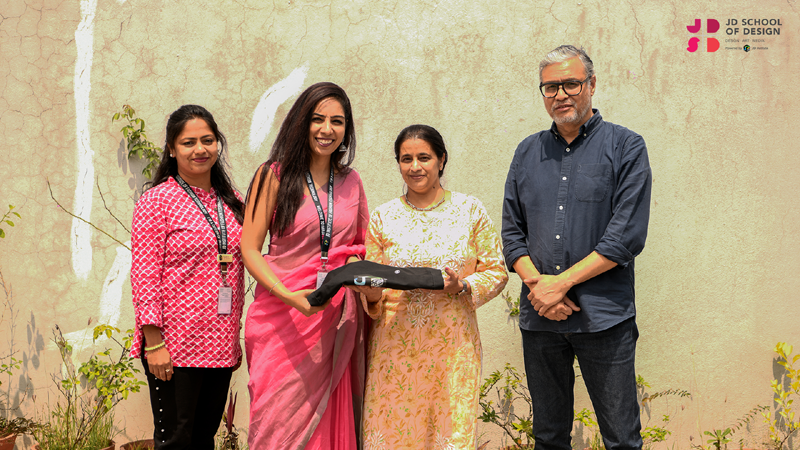
At JD School of Design, we understand that creative nurturing is always linked with mental and physical well-being. Above all, we try to remind students that living in the fast-paced world today is certainly not an easy task because stress is often inevitable; the best way to resolve this conflict is through understanding how to maintain mental and emotional health in their daily lives. With this vision in mind, we recently held an extremely insightful Well-Being Seminar, well-led by none other than the brilliant Dr. Kavita Desai. With diverse knowledge of homoeopathy, psychology, and hypnotherapy; a seasoned professional went on to share her years of experience and expertise with our students to support them better in the ups and downs of life.
Dr. Desai holds suffice for outlining her prowess in the realm of wellness. She is a homoeopath, life strategist, and consultant psychologist certified in clinical hypnotherapy by the American Hypnosis Association. She is also a certified teacher in clinical hypnosis and transpersonal psychology; hence, it was the perfect blend to leading such an important seminar. Not only is well-being about the mind but also about one’s physical health. Well, her holistic view of well-being with a mix of psychological and medical health engaged the students and provided them with practical tools to upgrade their regular lives.
Stress Management: A Key Focus
Stress management was the groundwork laid out by the seminar, and is it really relevant in a student’s life? Coursework and deadlines mount pressure to really perform at one’s best, and stress can easily mount a hydra-headed monster. The approach of Dr. Desai to the management of stress was very revealing and profound. She discussed the physiological and psychological impact that stress creates on the body and mind respectively.
Dr. Desai spoke about “stress triggers.” Once the students understand what causes the stress, they can begin to work on mitigating it even before it gets worse. She really pushed in terms of how important it is to recognize stress early on and also provided some practical tips on how to manage it.
Dr. Desai also discussed mindfulness and how deep breathing and progressive muscle relaxation could be used separately, as simple techniques to let a person “be in the moment.” Even in the most acute high-pressure situations, a student can remain calm while pondering what to do next. Techniques shared by many who attended showed that these methods have worked not only for academic stress but also in everyday peace.
The Importance of Self-Care
Self-care, to most people, has always been a luxury that lies in the way of busy living. But then again, Dr. Desai wanted to make it central to well-being: “Self-care is not indulgence but rather regular care to your body, mind, and soul.”
Whether it is reading a book, taking a walk in nature, doing a hobby, or other, certainly, one’s mood and energy levels can pick up dramatically with time for such activities. In fact, a very important point that was impressed on him is, the need to set appropriate boundaries-that is, to know when to say “no” and permit oneself to rest when needed.
Students were especially moved to action by the speech of Dr. Desai with regard to getting the amount of sleep necessary, healthy dieting, and exercise. She drew their attention to the fact that self-care is not a luxury but a necessity to find a balance and avoid burnout. Many of the students reflected on a newfound appreciation for self-care and an impulse to make minute, sustainable shifts in their daily lives.
Mindfulness Practices for Daily Life
Other important topics of the seminar included mindfulness, a process that affects the development of total awareness in real-time and relies upon being fully present in the moment. Dr. Desai takes the students through different exercises of mindfulness that can be easily integrated into their daily activities. Mindful breathing for example involves paying attention to the air in the body; the bit of body scanning and visualization reduces tension or anxiety and helps improve focusing skills.
Of the training exercises conducted, one seemed to be memorable: the “Five Senses” mindfulness technique. This exercise calms one’s mind and allows the mind to pause and reset. As Dr Desai explains: “Not just a reduction of stress but enables the sharpening of creativity-a vital skill for design students.”
Many participants shared incidents of mindfulness and how they maintain their concentration and lucidity in challenging projects. Through the incorporation of mindfulness, the students were better equipped to handle pressures from different aspects of their lives.
A Lasting Impact
There was evidence at the end of the seminar that Dr. Desai’s insights were going to stay with our students. Even after the seminar, almost all expressed a sense of empowerment, being practically equipped to manage stress, take the right priorities in self-care, and find mindfulness. This provided precious strategies to cope with the stresses of everyday life, but, more importantly, it deepened our appreciation for mental and physical well-being.
Well, at JD School of Design, we believe in a more comprehensive kind of education beyond the books. The seminar under the theme was well taken by Dr. Kavita Desai, for it indeed reflected how we are keen on nourishing students in every aspect of life: mind, body, and soul.